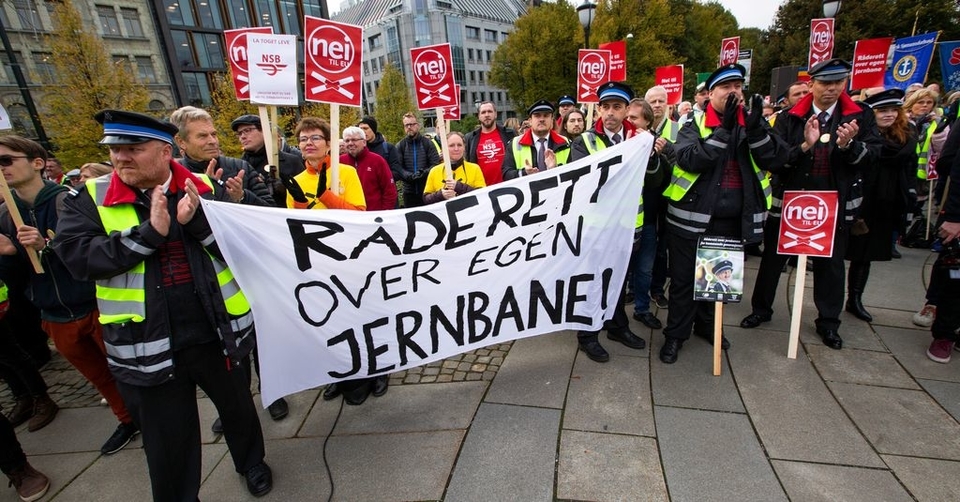On October 10, rail workers in Norway went on a two-hour strike, bringing the country’s railway system to a halt. They were protesting the implementation of the European Union’s (EU) fourth railway regulations package, which is likely to weaken the country’s control of its services. The workers raised the demand that railway regulations in the country be formulated and decided on by Norwegian officials. Several railway unions, including the Norsk Lokomotiv-mannsforbund (NLF) and the Norsk Jernbaneforbund (NJF), participated in the strike.
According to reports, hundreds also gathered to protest the implementation of the regulations in front of the Norwegian parliament, the Storting, on Thursday, and held marches in several cities, including Trondheim, Bergen and Stavanger. Workers also rallied in the smaller communities of Østfold, Hamar, Kristiansand, Arendal, Bryne, Fauske, Bodø, Mosjøen, Mo i Rana, Grong, Steinkjer, Levanger, Stjørdal, Oppdal and Roros.
The 4th EU Railway Package is a set of six legislative texts, formulated in 2016, to complete the process of establishing a single market for rail services – the Single European Railway Area. Even though Norway is not a member of the EU, it has to comply with the regulations due to its membership of the European Economic Area Agreement.
According to the unions, the implementation of the package will give the EU’s railway agency authority over Norwegian rail services. Norsk Jernbaneforbund (NJF) said Norway will be deprived of its own railways as bidding and competition over passenger traffic is promoted and made compulsory. Evaluations of forthcoming tenders will become meaningless because elected Norwegian officials will lose their decision-making powers over them.
Additionally, the package removes Norway’s jurisdiction over railway safety regulations, which could also jeopardize the safety of passengers and other rail services. The authority to issue safety certificates to train companies will shift from Norway’s National Railway Inspectorate to the European Union Agency for Railways (ERA). The ERA has consistently been working to remove laws and regulations mandating security requirements. It has sought to transfer the responsibility to individual companies. Norwegian railway management will also not be able to decide on the competence of railway employees, the NJF added.
Communist Party of Norway leader Runa Evensen expressed solidarity with the rail workers’ strike. She said that the previous railway regulation packages from the EU (I,II & III) had resulted in increased competition and privatization in both the domestic and international rail routes within EU countries. She added that the adoption of Package IV would accelerate this process and compromise Norway’s sovereignty and control over its railways.
Given the grave repercussions, the rail unions have called for more protests at the end of the month.





